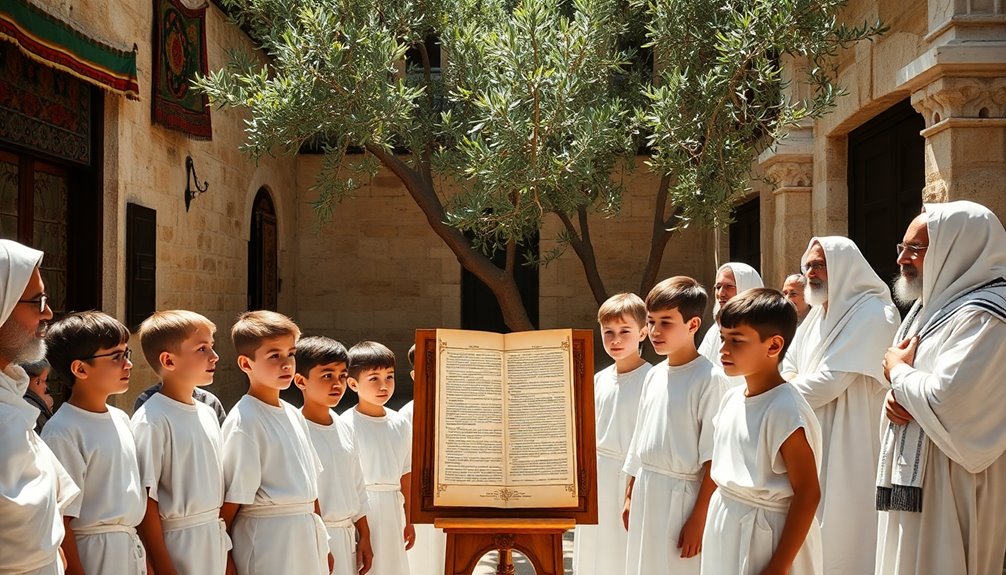The age of accountability in the Bible is the stage when children are seen as morally responsible before God. While there's no specific age mentioned, various scriptures indicate that children remain innocent until they can discern right from wrong. For instance, Isaiah 7:15-16 highlights this innocence, while Romans 1:20 points to accountability based on understanding. Jewish customs often set the age at 13, but this isn't biblically supported. Ultimately, God's mercy is emphasized until maturity is reached, offering comfort to many. Stick around to uncover more insights about accountability and how it applies to spiritual growth.
Key Takeaways
- The Bible does not specify an exact age of accountability, emphasizing individual maturity and understanding of right and wrong.
- Isaiah 7:15-16 suggests children are innocent until they can discern good from evil.
- Romans 1:20 indicates accountability correlates with one's level of understanding and rejection of God.
- Jewish customs recognize age 13 (Bar Mitzvah) for moral responsibility, though it lacks explicit biblical support.
- Biblical passages highlight God's mercy towards children, allowing them to grow without the burden of immediate accountability.
Introduction

In exploring the age of accountability in the Bible, you'll find that it sparks much debate among theologians and believers alike. The age refers to when children are considered morally responsible for their actions before God, but the Bible doesn't specify an exact age.
Many theologians argue that until children reach a certain level of spiritual understanding, they're covered by God's grace. This notion often draws on references like Romans 8:7, which highlights the human condition before God.
You'll also encounter passages such as Isaiah 7:15-16, suggesting that children remain innocent until they can discern right from wrong. While Jewish customs point to the age of 13, known as Bar Mitzvah, this age lacks solid biblical backing regarding accountability.
Figures like King David further emphasize God's mercy towards deceased infants, as seen in 2 Samuel 12:21-23, reflecting a belief in their safety in the Lord.
Ultimately, the concept of age and accountability remains nuanced, inviting you to explore how God's grace intersects with the moral development of children.
Biblical Age Accountability Verses

When exploring the concept of age accountability in the Bible, you'll find key verses that help shape our understanding.
Primary references like Isaiah 7:15-16 and Matthew 18:3 highlight the developmental stages of discernment and faith in children.
Additionally, secondary verses such as Psalm 51:5 and Romans 1:20 further clarify the implications of sin and accountability.
Primary Bible References
Understanding the concept of age accountability in the Bible involves examining key verses that shed light on the matter. While the Bible doesn't specify an exact age of accountability, passages like Isaiah 7:15-16 suggest that children may be considered innocent until they comprehend right from wrong. This idea aligns with the notion that children mature at different rates, impacting their understanding of sin and accountability.
Psalm 51:5 acknowledges our innate sinful nature, but it also emphasizes that accountability is tied to individual maturity. Romans 1:20 further illustrates this, noting that people are held accountable for rejecting God based on their level of understanding.
Additionally, 2 Samuel 12:21-23 reflects King David's belief that his deceased infant son is safe with the Lord, highlighting God's mercy toward those who die before reaching an age of accountability identified in Scripture.
The theological perspective found in 1 John 2:2 reinforces this view, affirming that Christ's sacrifice covers everyone incapable of making a conscious decision for salvation. Together, these verses provide a framework for understanding age accountability in a biblical context.
Secondary Bible References
Secondary Bible references provide additional insight into the concept of age accountability, emphasizing God's grace toward children. The Bible doesn't specify a definitive age, leaving it to God's wisdom.
Isaiah 7:15-16 hints at a developmental milestone when a child begins to discern good from evil, suggesting that this ability marks the transition to accountability. In Deuteronomy 1:39, we see that children lacking this discernment aren't held accountable for their parents' sins, highlighting God's divine mercy toward the innocent.
Furthermore, in 2 Samuel 12:21-23, King David's hope for his deceased child illustrates that young children aren't condemned due to inherited sin, reinforcing the belief in their protection under God's grace.
Jesus, too, in Matthew 18:3, underscores the importance of childlike faith, implying that children are viewed favorably by God until they grasp the concept of sin and accountability.
Thus, from age to age, the Scriptures consistently affirm that God's mercy extends to children, allowing them to grow and learn without the burden of accountability until they can truly understand the weight of good and evil.
Ancient Jewish Coming-Of-Age Rituals

In ancient Jewish culture, significant milestones mark the transition from childhood to adulthood, with the bar mitzvah and bat mitzvah standing out as key coming-of-age rituals. These ceremonies symbolize the age of accountability, where boys at age 13 and girls at age 12 accept their religious responsibilities and become recognized members of the Jewish community.
During a bar mitzvah, the boy publicly reads from the Torah, symbolizing his commitment to observe Jewish laws. The term "bar mitzvah" translates to "son of the commandment," while "bat mitzvah" means "daughter of the commandment." This highlights their new roles within the community and their obligation to uphold the commandments.
Before reaching these ages, children were generally not held accountable for their actions in a religious sense, reflecting a belief in their innocence until maturity.
These coming-of-age rituals emphasize the importance of education in Jewish law, paving the way for a deeper understanding of their faith. As you can see, the bar mitzvah and bat mitzvah not only mark personal growth but also signify a commitment to a larger community and its traditions.
Cultural Significance of Maturity

Maturity holds profound cultural significance, marking a pivotal transition in an individual's life. In various societies, this transition is celebrated through ceremonies, like bar and bat mitzvahs, recognizing the onset of moral responsibility at ages 12 or 13. These events reflect how communities view the shift from childhood innocence to a more accountable stage of life.
You'll notice that maturity often aligns with significant milestones such as completing education or gaining the right to vote, emphasizing societal expectations for personal accountability. Legal age thresholds, like the age of consent, illustrate how cultures institutionalize this responsibility.
Most cultures also cherish childhood innocence, prioritizing the protection of children until they reach an understood age of accountability. This reflects a shared belief about the moral capacity of youth.
As children develop their conscience and moral reasoning, communities adapt their approaches to discipline and spiritual teachings, acknowledging that accountability evolves with cognitive and emotional maturity. Additionally, the concept of cooperative co-parenting is often highlighted in discussions about maturity, emphasizing the importance of shared responsibilities as individuals transition into adulthood.
This cultural significance of maturity shapes how you and those around you navigate life, guiding your actions, decisions, and responsibilities as you grow into adulthood.
Misunderstanding Accountability Age

You might think the age of accountability is a specific age mentioned in the Bible, but that's a common misconception.
Many people confuse cultural practices, like the Jewish bar mitzvah, with biblical teachings, which can lead to misunderstandings about when a child is truly accountable.
Recognizing these misinterpretations is crucial for understanding individual maturity and the importance of evangelizing to children.
Debunking Common Misconceptions
Understanding the age of accountability can be confusing, especially with the variety of beliefs surrounding it. One common misconception is the idea that all children are innocent until they reach a specific age. However, biblical passages emphasize that we're all born with inherited sinfulness (Psalm 51:5). This means that while children may not fully grasp the concept of sin, they aren't considered entirely free from it.
Another misconception is the belief that the age of 13 serves as a universal marker of accountability, based on Jewish customs. The Bible, however, doesn't explicitly support this idea. Instead, accountability is better understood as a developmental process where children gradually learn about their actions and moral responsibility.
Many also hold the belief that God's mercy covers children who die before reaching an age of accountability. This is rooted in the understanding of His grace and love, as illustrated in biblical narratives like David's assurance of his deceased child's safety in God's care (2 Samuel 12:23).
Cultural Interpretations of Maturity
Different cultures interpret maturity in various ways, often leading to distinct beliefs about the age of accountability. For instance, some traditions suggest that age 12 marks this transition, drawing from Jewish customs like bar and bat mitzvahs, which highlight personal responsibility before God. However, there's no explicit biblical support for a specific age, making these cultural interpretations more about societal norms than divine mandates.
The understanding of accountability varies significantly across cultures, as each society decides when a child is capable of moral reasoning and grasping the concept of sin. This creates a landscape where the age of accountability isn't universally applicable.
Furthermore, developmental psychology shows that children mature at different rates, complicating the idea of a set age for accountability. Misunderstandings surrounding this concept can lead to confusion and anxiety among parents regarding their children's spiritual status.
In contexts emphasizing strict age-based doctrines, it's crucial to recognize that maturity isn't only about age but also about individual development and understanding. Embracing these cultural interpretations helps foster a more nuanced view of accountability and maturity.
Youth Mentorship Initiatives

Mentoring young believers is crucial for guiding them through their spiritual journeys.
By engaging in intergenerational faith-building activities, you can create meaningful connections that foster growth and understanding of accountability.
Let's explore how effective mentorship can shape their decision-making and moral reasoning as they transition into adulthood.
Mentoring Young Believers Effectively
Building authentic relationships is crucial when it comes to mentoring young believers effectively. As a mentor, you should prioritize trust and open communication, creating a safe space for young children to discuss their faith in Christ.
Use age-appropriate Bible studies to help them grasp key concepts, including accountability and the importance of God's mercy in their lives. Engaging in service projects and community involvement allows young believers to put their faith into action, reinforcing the idea that living out their beliefs is essential.
Regular check-ins and goal-setting sessions can provide the structure they need, fostering accountability while guiding them through their spiritual journey. Additionally, it's vital to understand the developmental stages and unique challenges faced by youth.
Providing training for yourself as a mentor can enhance your ability to address their specific questions about faith and accountability. By investing time and effort into these initiatives, you can create a meaningful mentorship experience that nurtures their growth in Christ.
In doing so, you'll empower young believers to embrace their faith confidently and responsibly.
Intergenerational Faith-Building Activities
Engaging young believers in intergenerational faith-building activities can significantly enhance their spiritual development. These mentorship initiatives allow older generations to share their experiences and insights about faith, creating a rich learning environment for children and teens.
Through structured programs, adults can guide youth in understanding biblical teachings, helping them navigate their spiritual journeys effectively.
Research shows that children with mentors who actively participate in their faith development are more likely to remain engaged in their religious communities as adults. By incorporating activities like group Bible studies, service projects, and intergenerational worship, you can foster meaningful relationships that support youth in exploring their faith.
Not only do these initiatives benefit young believers, but they also enrich the lives of older participants. As mentors share their wisdom and experiences, they find a renewed sense of purpose and community within the church.
This reciprocal relationship strengthens everyone's faith journey and creates a cohesive environment for spiritual growth. Embracing intergenerational mentorship in your church can create lasting impacts, ensuring that faith is passed down through generations, rooted firmly in the teachings of the Bible.
Final Thoughts on Accountability

When considering the age of accountability, it's essential to recognize that this concept isn't strictly defined in scripture, leaving room for interpretation and personal belief. The age at which a child knows right from wrong varies, and God knows each child's heart and understanding.
Many believe that until a certain age, children exist in a state of grace and mercy, protected from the consequences of their sinful state. Biblical passages, such as Isaiah 7:15-16, hint at a time when children are innocent, suggesting that they may not be held accountable for their actions until they reach a level of maturity.
As parents, you bear the responsibility to guide your child through spiritual development, teaching them about God and the gospel. This nurturing helps them transition into accountability.
Ultimately, you can find comfort in knowing that God's mercy extends to those who die before reaching this age. It's a reminder that His love encompasses all, especially the innocent.
Embracing the age of accountability can foster a deeper understanding of grace, allowing you to appreciate the balance between justice and mercy in your faith journey.
Additional Resources

To further explore the age of accountability and its implications, you'll find a wealth of resources that can deepen your understanding and provide guidance. One key resource is "Safe in the Arms of God" by John MacArthur, which examines God's grace and mercy toward children, especially when a child dies. This book addresses the theological aspects of childhood salvation and how it relates to the age of accountability.
Additionally, organizations like the Christian Research Institute and Focus on the Family offer valuable support for parents wrestling with questions about childhood accountability and salvation. They provide insights into how to navigate these complex issues while nurturing spiritual maturity in children.
For practical advice, consider reading "The New Dare to Discipline," which helps parents implement discipline methods that align with children's developmental stages.
Lastly, exploring the works of theologians such as Charles Spurgeon can shed light on various perspectives regarding child salvation and the implications of real rejection. Understanding Jewish customs, like bar and bat mitzvahs, can also enrich your grasp of spiritual maturity and its connection to the age of accountability.
Frequently Asked Questions
What Is the Age of Accountability According to the Bible?
You might wonder about the age of accountability and how it's determined.
While there's no specific age outlined, it's often linked to an individual's spiritual understanding and maturity.
Traditionally, some cultures see around age 12 as significant, but this isn't directly stated in scripture.
The emphasis is on God's grace and mercy, suggesting that until a person comprehends sin and their relationship with God, they're covered by His love and understanding.
At What Age Does a Child Become Morally Responsible for His Actions?
Determining when a child becomes morally responsible for their actions isn't straightforward. Generally, it's believed that this awareness develops as they grow, often around pre-adolescence.
You might notice signs of a child's conscience and sense of guilt emerging during this time. As they begin to understand right from wrong and the consequences of their actions, they gradually take on more moral responsibility.
Each child's journey can vary based on their unique experiences and understanding.
What Does the Bible Say About Unborn Babies Going to Heaven?
The Bible doesn't explicitly state what happens to unborn babies, but it offers hope. Passages like 2 Samuel 12:21-23 suggest that God's mercy extends to those who haven't reached moral understanding.
You can see this in Jesus' love for children in Matthew 19:14, implying God welcomes them into His grace.
With verses like Jeremiah 1:5 highlighting God's awareness of individuals before birth, it's comforting to believe unborn babies are cherished in His plan.
What Age Does God Consider You an Adult?
God doesn't specify a certain age when He considers you an adult.
Instead, He looks at your understanding and maturity. As you grow, you develop a sense of right and wrong, and that's when accountability comes into play.
It's about your relationship with God and how you respond to His guidance.










